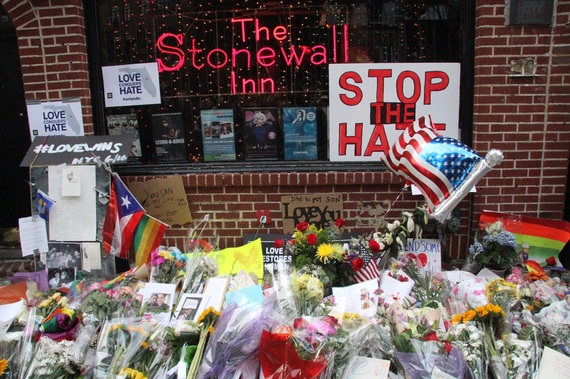
On Sunday, I woke up earlier than usual, brimming with the excitement about marching in the Puerto Rican Day Parade alongside LGBTQ honorees. After 50 years, the parade was dedicated for the first time to family unity and LGBTQ rights--a huge milestone and symbolic step forward for our country, where many people still deny our rights and equality.
Then I saw the devastating news of the mass shooting at a gay nightclub in Orlando, Florida, a state that is home to more than 1 million Puerto Ricans (a third whom lives in Orlando), including my family (and even myself when I was 5 years old). It happened during a"Latin night", when hundreds of people were dancing and celebrating Pride Month.
My heart and soul broke. As a young, gay, Latino, I feel so deeply connected to the lives lost--and the pain and fear inflicted on two of my communities at once.
I can't help but think: This could have been me. This could have been any of us.
There is no evidence that the Latino community was a specific target of this attack, but it has devastated thousands of Latinos and Puerto Rican families who lost their loved ones. About half of the victims in this massacre were Puerto Rican, and around 90 percent were Latinos. Many victims were family members or friends of people I know, like Jonathan Camuy. These were queer, bright, promising young lives of color taken away too soon. Nuestros hermanos y hermanas.
It was not only a reprehensible attack on LGBTQ people, but an act of barbarity against every one of us. Florida is grieving. Puerto Rico is grieving. The LGBTQ community is grieving. The United States and the world are grieving.
As a 25-year-old Puerto Rican gay man who came to the mainland two years ago seeking a better future, this has struck me in a profound way. I can find few words to explain my feelings of frustration, anger, and sorrow. 
Photo by Luis Carle
What happened in Orlando was the deadliest mass shooting in U.S history. It is one of the darkest chapters in our LGBTQ history.
But we cannot give up. Now, our attention should be focus in helping the families and all the people affected.
However, we also must redouble our work to create meaningful change that will transform and eradicate the root causes of these tragedies--violence based on sexual orientation and gender identity, with a particular attention to people of color.
Take the issue of gun violence in this country, which claims 33,000 lives per year. We all know what we should be doing; we must come together and call on our leaders to challenge the status quo and the gun lobby.
And while we secure concrete progress, we must change hearts and minds as we seek to eliminate the animus that our LGBTQ lives with every day and manifests in so many ways--through bullying, physical intimidation, discrimination, exclusion, or systematic and institutionalized violence.
Throughout my childhood, I suffered firsthand the cruelty of bullying and hate towards me and my family. I was screamed at, beaten, and sexually harassed. My experience is not unique. LGBT people from all walks of life have very similar stories, with different vulnerabilities that stem from the intersection of race, gender and economic status. Let's remember for a moment the particular risk and violence transgender Americans face every day, including last year, which was the deadliest year with more than 21 brutal murders of trans women, most of whom were women of color.
We also need to speak out against the hateful, bigoted, homophobic and racist rhetoric coming from some politicians and public figures who contribute to a toxic environment that allows and encourages this kind of violence in the first place.
My Puerto Rican compatriot Ricky Martin recently tweeted "I'm gay and I am not afraid", and we all should embrace that resilient spirit that has raised us in moments of hardship.
Unfortunately, I am terrified. This attack just confirmed for me what I have long felt: It is not always safe to be us--to walk, to dance, and to live freely as ourselves. We still face threats of violence against our bodies, dignity, and lives for being who we are and who we love.
But I know we cannot succumb to that fear. While we must remain vigilant, we must also be defiant, trumping hate with love and showing that our strength lies in our values of inclusion and respect. As Hillary Clinton said this week: "We have to stand together. Be proud together. There is no better rebuke to the terrorists and all those who hate."
The hate of this attack sent shockwaves throughout the world, but we know our love is stronger than hate. Let's embrace the beauty of who we are. Let's disseminate the power of that love, because as Lin Manuel Miranda said,"#LoveisLove", and it always wins.